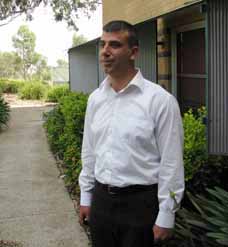The extreme Sunni Islamic group ISIS – Islamic State in Iraq and Syria – is not supported by history as it claims to set up a fundamentalist Islamic state, and this has implications for Australia, says two Charles Sturt University (CSU) academics.
After its recent military successes, ISIS has proclaimed an independent state in territory recently seized in Syria and Iraq. Its apparent long-term aim is to expand that state into a greater Caliphate, unifying the Islamic world under a single Caliph – a supreme religious and political ruler.
These experts believe however, that the extreme violence in support of these claims is not justified by history.
 Associate Professor Mehmet Ozalp, director of CSU's Centre for
Islamic Studies and Civilisation (CISAC), explained that, "The 1.6 billion
worldwide Muslim community is usually grouped under three main orientations:
Associate Professor Mehmet Ozalp, director of CSU's Centre for
Islamic Studies and Civilisation (CISAC), explained that, "The 1.6 billion
worldwide Muslim community is usually grouped under three main orientations:
- the majority Sunni Muslims (about 85 per cent of the Muslim world), who follow the example of the Prophet Mohammad;
- the important Shi'ah minority, found mainly in and around Iran (about 13 per cent), who follow Ali (died 661 AD), the son-in-law and cousin of Prophet Muhammad as the recognised leader after the Prophet; and,
- The Kharijites or outsiders (2 per cent), who include many minorities some of whom have developed extreme violent doctrines not supported by the Qur'ān or the teachings of Prophet Muhammad.
"Sunni and Shi'ah Muslims accept and use the same Qur'ān, believe in the same essential truths and practice the five pillars of Islam. However, over time the Shi'ah paradigm developed a number of additional beliefs and practices reflecting their own interpretation of Islam.
"Although the present situation in Iraq is deeply worrying in its direction towards sectarian violence, the main reasons for the conflict arise from the present conditions and the political allegiances of each side rather than Islam itself. Importantly, ISIS does not represent the Sunni Islam. Similar to many Al-Qaeda off-shoots, they are more like Kharijites who opposed both Shi'itesand the Sunnis and were known for their ruthless violence."
CSU philosopher and senior researcher at the CSU Centre for Applied Philosophy and Public Ethics, Dr Steve Clarke continues: "The Islamic world was mainly ruled by Caliphs, from the 7th to 13th Century AD, when the Mongol invasion utterly transformed that world. Muslim rulers and would-be rulers have often styled themselves as Caliphs since then, harking back to a golden age when the Islamic world was united, powerful and dynamic. The appeal of a call for a return to a golden age masks serious disagreement about the exact nature of the ideal Caliphate among the many Muslims who find this ideal attractive.
"While several of the Caliphs exercised consensus decision making and displayed religious tolerance, these are not features of the Caliphate that ISIS appear to hope to establish. Like Al-Qaeda their aim is to establish a fundamentalist Caliphate, and they are reported to be imposing extremely harsh religiously based laws in captured territory.
"One way to help limit the appeal of organisations like ISIS and Al Qaeda in Australia is to raise awareness of the history of the Islamic world. The original flourishing of Islam did not depend on extremist fundamentalist rule, and there is no good reason to suppose that extremist fundamentalist rule will lead anyone back to that golden age."
See more comments on Islamic studies at CSU here, here, and here.





Social
Explore the world of social